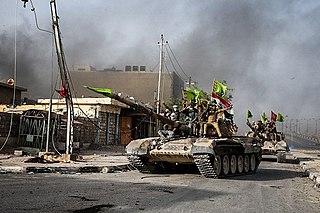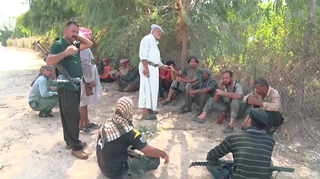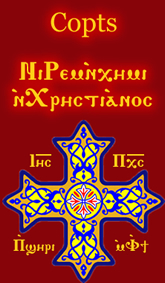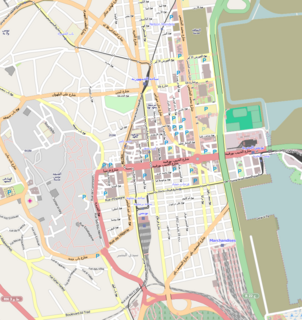 W
WIslamic terrorism refers to terrorist acts committed by Islamists who have a religious motivation.
 W
WIn May 2020, a series of insurgent attacks took place in Afghanistan, starting when the Taliban killed 20 Afghan soldiers and wounded 29 others in Zari, Balkh and Grishk, Helmand on 1 and 3 May, respectively. On 12 May, a hospital's maternity ward in Kabul and a funeral in Kuz Kunar (Khewa), Nangarhar were attacked, resulting in the deaths of 56 people and injuries of 148 others, including newborn babies, mothers, nurses, and mourners. ISIL–KP claimed responsibility for the funeral bombing, but no insurgent group claimed responsibility for the hospital shooting.
 W
WThe Arakan Rohingya Salvation Army (ARSA), formerly known as Harakah al-Yaqin, is a Rohingya insurgent group active in northern Rakhine State, Myanmar. According to a December 2016 report by the International Crisis Group, it is led by Ataullah abu Ammar Jununi, a Rohingya man who was born in Karachi, Pakistan, and grew up in Mecca, Saudi Arabia. Other members of its leadership include a committee of Rohingya émigrés in Saudi Arabia.
 W
WThe Fatwa on Terrorism and Suicide Bombings is a 600-page, 512-page Islamic decree by scholar Muhammad Tahir-ul-Qadri which demonstrates from the Quran and Sunnah that terrorism and suicide bombings are unjust and evil, and thus un-Islamic. It was published in London as a book. The English edition was published in the UK by Minhaj-ul-Quran Publications. Qadri released the fatwa on 2 March 2010.
 W
WIn July 2013, at the same time as mass protests began against the 3 July coup d'état which deposed Mohamed Morsi, and in parallel with the escalation of the already ongoing jihadist insurgency in the Sinai Peninsula, pro-Muslim Brotherhood militants started violent attacks against policemen and soldiers in Central and Western Egypt. In the following months, new Islamist armed groups were created to reinstate Islamist rule in Egypt, like Soldiers of Egypt and the Popular Resistance Movement. Since 2013, violence in mainland Egypt has escalated and developed into a low-level Islamist insurgency against the Egyptian government.
 W
WThe War in Iraq was an armed conflict between Iraq and its allies and the Islamic State of Iraq and the Levant which began in December 2013 and ended in December 2017. In 2013, the insurgency escalated into a full-scale war with the conquest of Ramadi, Fallujah, Mosul, Tikrit and other towns in the major areas of northern Iraq by the Islamic State of Iraq and the Levant. At its height, ISIL held 56,000 square kilometers of Iraqi territory, containing 4.5 million citizens. This resulted in the forced resignation of Iraqi Prime Minister Nouri al-Maliki, as well as a massive airstrike campaign by the United States and at least a dozen other countries, participation of American and Canadian troops in ground combat operations, a $3.5 billion U.S.-led program to rearm the Iraqi Security Forces, a U.S.-led training program that provided training to nearly 200,000 Iraqi soldiers and police, the participation of Iranian troops including armored and air elements, and military and logistical aid provided to Iraq by Russia.
 W
WThe ISIL insurgency in Iraq is an ongoing low-intensity insurgency that began in late 2017 after the Islamic State of Iraq and the Levant (ISIL) lost territorial control in the War in Iraq of 2013 to 2017. ISIL and allied White Flags fought the Iraqi military and allied paramilitary forces.
 W
WOn 25 August 2017, Hindu villages in a cluster known as Kha Maung Seik in the northern Maungdaw District of Rakhine State in Myanmar were attacked and 99 Bengali Hindu villagers were massacred by Muslim insurgents from the Arakan Rohingya Salvation Army (ARSA). A month later, the Myanmar Army discovered mass graves containing the corpses of 45 Hindus, most of whom were women and children.
 W
WThe Society of the Muslim Brothers, better known as the Muslim Brotherhood, is a transnational Sunni Islamist organization founded in Egypt by Islamic scholar and schoolteacher Hassan al-Banna in 1928. Al-Banna's teachings spread far beyond Egypt, influencing today various Islamist movements from charitable organizations to political parties—not all using the same name.
 W
WThe persecution of Copts is a historical issue in Egypt against Coptic Orthodox Christianity and its followers. It is also a prominent example of the persecution of christians in the Middle East despite the religion being native to the region. Copts are the Christ followers in Egypt, usually Oriental Orthodox, who currently make up 10% of the population of Egypt — the largest religious minority of that country. Copts have cited instances of persecution throughout their history and Human Rights Watch has noted "growing religious intolerance" and sectarian violence between Christians and Muslims in Egypt in recent years, as well as a failure by the Egyptian government to effectively investigate properly and prosecute those responsible. Since 2011 tens of Egyptian Copts and non-copts have been killed and injured in sectarian clashes, and many homes, cars, Churches and businesses have been burned. In just one province (Minya), 77 cases of sectarian attacks on Copts between 2011 and 2016 have been documented by the Egyptian Initiative for Personal Rights. The abduction and disappearance of Coptic Christian women and girls also remains a serious ongoing problem.
 W
WSéléka CPSK-CPJP-UFDR was an alliance of rebel militia groups that subjugated the Central African Republic (CAR) on 24 March 2013. After its official dissolution in September 2013, the remaining rebel groups became known as Ex-Séléka. Séléka leader Michel Djotodia became the nation's president from March 2013 until his resignation in January 2014. Members of Séléka were almost entirely Muslim.
 W
WQuasi-state-level jihadist groups, including Boko Haram and the Islamic State of Iraq and the Levant, have captured and enslaved women and children, often for sexual slavery. In 2014 in particular, both groups organised mass kidnappings of large numbers of girls and younger women.
 W
WThe Soliman Shooting is a violent incident which occurred on January 3, 2007 in the Tunisian region of Soliman, south-east of Tunis. The national police forces fought an armed group calling itself "Asad ibn al-Furat's army" which had been initially labeled by the government as "dangerous criminals". A previous shooting involving this same group had taken place on December 23, 2006 placing it in a context of jihadist terrorism and anarchist, insurgent, Islamist militancy.
 W
WHay'at Tahrir al-Sham (HTS), commonly referred to as Tahrir al-Sham, is an active Sunni Islamist militant group involved in the Syrian Civil War. It was formed on 28 January 2017 as a merger between Jabhat Fateh al-Sham, the Ansar al-Din Front, Jaysh al-Sunna, Liwa al-Haqq, and the Nour al-Din al-Zenki Movement. After the announcement, additional groups and individuals joined. The merged group is currently led by Jabhat Fatah al-Sham and former Ahrar al-Sham leaders, although the High Command consists of leaders from other groups. Many groups and individuals defected from Ahrar al-Sham, representing their more conservative and Salafist elements. The Ansar al-Din Front and Nour al-Din al-Zenki Movement have since split off from Tahrir al-Sham. It had an estimated 20,000 members in 2019.
 W
WJihad terror attacks by Islamist extremists enacted to further a perceived Islamic religious or political cause occur globally. Some of these plots have been successfully prevented. The culprits used tactics such as arson, vehicle rampage attacks, bomb threats, suicide attacks, bombings, spree shooting, stabbings, hijackings, kidnappings and beheadings. The following is a list of thwarted Islamist terrorist attacks that have received significant press coverage since the Iranian revolution in 1979. See the list of Islamist terrorist attacks for major incidents that did result in violence.
 W
WOn 24 November 2015, a bus carrying Tunisian presidential guards exploded, killing 12, on a principal road in Tunis, Tunisia. ISIL claimed responsibility for the attack. The bomber, who also died in the attack, was identified as Houssem Abdelli.